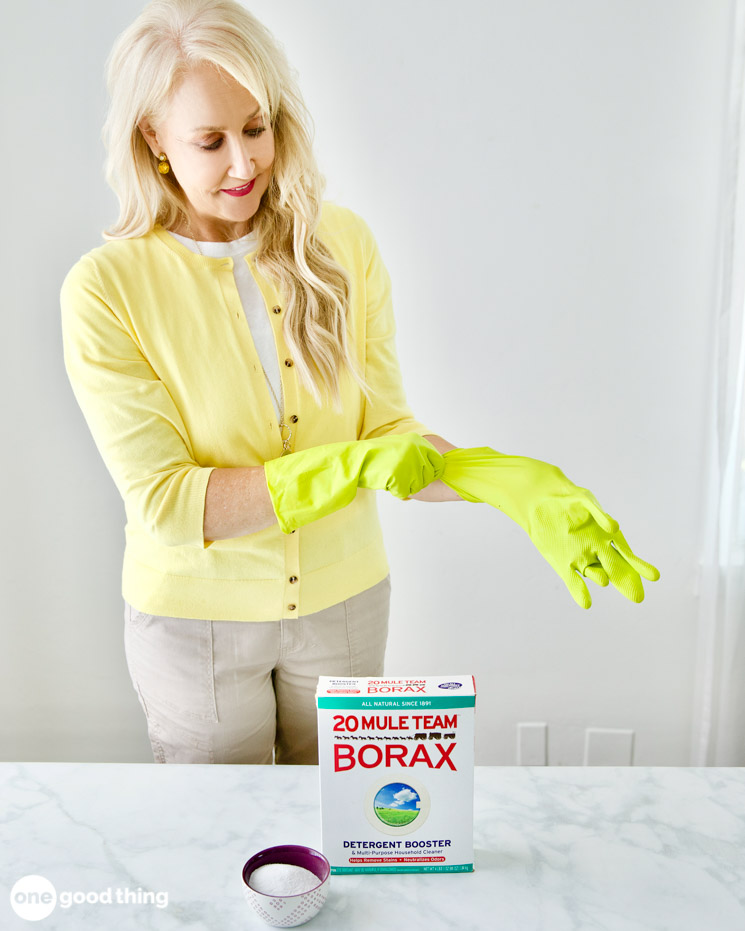
Many of my favorite homemade and DIY cleaning solutions use a lot of the same basic ingredients, such as baking soda, vinegar, and more. Many of these ingredients are familiar to most people, but there’s one in particular that remains mysterious to many: borax.
If you have questions about borax, you’ve come to the right place! Because the purpose of this post is to answer as many of your questions as possible, so you can leave with a new understanding and appreciation of this versatile substance!
By the end of this post, you’ll not only understand what borax is and how it works, you’ll also understand how to use it safely and effectively around the house. (I think you’ll also see exactly why it’s one of my all-time favorite natural cleaning supplies, and who knows? It might just become one of yours too!) :-)

What Is Borax?
Borax is a naturally occurring mineral that is primarily mined from evaporated lakes in California and Turkey. It goes by a bunch of other science-y names too, including sodium borate, sodium tetraborate, and disodium tetraborate (all of which refer to the basic elements found in borax: boron, oxygen, hydrogen, and sodium!)
Before it can be boxed up and shipped out to the cleaning aisle at a grocery store near you, borax is partially dehydrated to form a fine white powder. But even though borax might resemble baking soda, baking powder, and other white cleaning powders, borax, baking soda and baking powder are not the same thing.
Due to its unique structure and properties, borax plays important roles in many different commercial applications, including as a buffer in chemical laboratories, aiding gold extraction in mining operations, and as a component in the production of glass and ceramics. Who knew that one natural powder could do so much?

How Does Borax Work?
With a pH of around 9.5 (putting it somewhere between baking soda and toothpaste on the pH scale), borax is slightly alkaline and forms a basic solution when added to water. Basic solutions can be really useful for both cleaning and laundry purposes because of the way they break down acidic, fatty, and oily substances—like the ones that lead to food stains and greasy messes!
This is one of the reasons why borax is often advertised as a “laundry booster.” Adding borax to the wash water raises its pH (similar to washing soda, which has an even higher pH,) helping to break up stains and making it easier for your laundry detergent to do its job too!

Is Borax Safe, Or Is It Toxic?
Borax is perfectly safe to use, as long as you plan to handle it with the same care you would use with other household cleaning products. While it isn’t “acutely toxic” (meaning brief exposure won’t have poisonous effects), borax can irritate your skin and eyes if you handle it without protective gloves or in an area that isn’t well ventilated.
Concerns over the potential toxicity of borax have led to it being banned in certain areas of the world. However, it’s important to note that the research behind those concerns often failed to make a distinction between borax and boric acid, a related (but much more toxic) boron compound.
A 2006 evaluation by the U.S. Environmental Protection Agency found no signs of toxicity resulting from exposure to borax, nor did it find evidence of cytotoxic effects in humans.

Using Borax Safely
You can use and store borax safely around the house by taking these simple precautions:
- Use in well-ventilated areas to avoid inhaling it or getting it into your mouth, nose, or eyes.
- Wear protective cleaning gloves when working with borax.
- After cleaning with borax, rinse the area thoroughly with clean water.
- Store it safely out of the reach of children and pets.

How To Use Borax As A Laundry Booster
While borax can’t do everything your laundry detergent can do, it does make a great laundry booster! When used in conjunction with your normal detergent, borax makes it easier for your detergent to clean your clothes by softening the water in your washing machine.
(If you use my homemade powdered laundry detergent like I do, keep in mind that you won’t have to add borax separately. It’s already included as an ingredient in the detergent, so there’s no need to add more!)

More Uses For Borax
As a versatile “booster” ingredient, borax is included in many different types of products. Here are just a few of the types of products that feature borax in their ingredient lists:
- Insecticides
- Herbicides
- Fungicides
- Laundry boosters
- Waster softening agents
- Flame retardants
- Teeth whitening products
- Glass, ceramics, and pottery
For over two dozen helpful tips for using borax around the house, including cleaning products, homemade slime, and more, read my post about household uses for borax here.

Where To Buy Borax
You can find borax in the laundry aisle of many grocery stores and most big box retailers. (Make sure to check the top and bottom shelves when you’re looking for it, as it often gets stocked in these less prominent positions!)
The most common brand of borax you’ll see in stores is 20 Mule Team Borax, which gets its name from the method used to transport it away from surface mines in Death Valley in the late 1800s. 20 Mule Team Borax is also available to purchase online through Amazon, Walmart, and other online retailers.
Do you use borax at home?
No comments:
Post a Comment